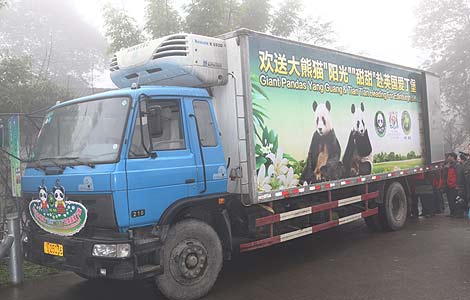Business alliance may give Europe economic boost
Updated: 2011-12-08 07:54
By Cecily Liu (China Daily)
|
|||||||||
|
|
LONDON - An alliance of leading private-sector Chinese companies plans to set up offices in Europe, potentially giving a boost to the debt-ridden region.
About 20 representatives from the Aigo Entrepreneurs Alliance are on a 10-day trip, ending on Monday, to select locations for "business incubators" in four possible locations: the United Kingdom, Denmark, the Netherlands and Belgium.
Business incubators are programs that help start-ups expand through a network of resources and services.
Originating in the Batavia Industrial Center in the United States half a century ago, this model has quickly gained popularity in Europe and more recently Asia, including China.
The first location will be chosen after the delegation returns, and employees are expected to move into the new offices as early as February.
"Many Chinese companies lack confidence and experience when they expand overseas for the first time, but expanding collectively they can help each other overcome the challenges of a new environment," said Feng Jun, president of the electronics company Aigo Digital Technology Co Ltd, who set up the alliance in his company's name.
Founded in June, the alliance aims to help 100 Chinese companies join the ranks of the Fortune 500.
It has a membership of about 100 companies, including some of China's best-known brands, such as Gree Electric Appliances Inc and Beijing Huiyuan Food and Beverage Co.
They represent a new generation of Chinese companies succeeding through high-tech innovation and brand-value creation rather than exporting.
"Now is the time for Chinese companies to become global brands and transform the 'made-in-China' label to 'created in China' ," said Feng in London this week.
"The global recession has created good commercial opportunities for Chinese businesses because costs associated with setting up overseas offices will be lower, but we still need to take a step-by-step approach," he added.
Feng raised the incubator idea as early as 2008. The alliance's incubators will be supported by overseas governments through free space for research and development (R&D), sales centers and facilities shared with local partners.
The government of Belgium's Walloon Region has promised to subsidize 70 percent of the R&D costs for Chinese brands in Europe.
"Chinese businesses' overseas expansion will benefit our local economy enormously through employment and tax revenue," said John Comber, director of regeneration, enterprise and skills at Greenwich Council, a borough council in London.
Mitre Passage, a commercial building that the Greenwich Council leases to private businesses, was the first stop on the alliance's incubator location hunt. The council has offered to waive one year's rent for the group.
"We are hoping to provide a flexible service that accommodates Chinese businesses' requirements," said Comber, adding that the council regularly receives Chinese government representatives who come to explore business opportunities in London.
The business incubator is expected to generate a large number of local jobs in the long term, said Xue Li, an alliance executive.
"We have a policy that each business can only bring two employees from China, so they must hire locally if they require additional workers," Xue said.
Shi Jihong, chairman of the luggage manufacturer Newcomer Group Co Ltd, said that recruiting locally "makes commercial sense".
"It's a mistaken belief that Chinese businesses can best compete on low labor costs. If I hire a Chinese worker on a lower salary, I'll probably end up spending more on helping him to get used to the European working environment," he said.
British government departments - the UK Trade & Investment Office, the Home Office and London & Partners, which is the British capital's official promotional organization - sent representatives to meet the group and help them understand the UK business environment.
"The next decade is the best time for Chinese businesses to expand overseas," said Jeff Cao, head of Asia Pacific at London & Partners.
The European recession and the increasing convertibility of the renminbi are two factors benefiting Chinese businesses expanding into Europe, he said.












